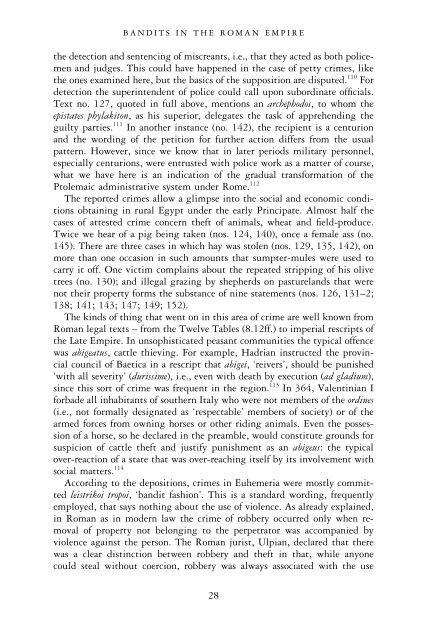Create successful ePaper yourself
Turn your PDF publications into a flip-book with our unique Google optimized e-Paper software.
BANDITS IN THE ROMAN EMPIRE<br />
the detection and sentencing of miscreants, i.e., that they acted as both policemen<br />
and judges. This could have happened in the case of petty crimes, like<br />
the ones examined here, but the basics of the supposition are disputed. 110 For<br />
detection the superintendent of police could call upon subordinate officials.<br />
Text no. 127, quoted in full above, mentions an archephodos, to whom the<br />
epistates phylakiton, as his superior, delegates the task of apprehending the<br />
guilty parties. 111 In another instance (no. 142), the recipient is a centurion<br />
and the wording of the petition for further action differs from the usual<br />
pattern. However, since we know that in later periods military personnel,<br />
especially centurions, were entrusted with police work as a matter of course,<br />
what we have here is an indication of the gradual transformation of the<br />
Ptolemaic administrative system under Rome. 112<br />
The reported crimes allow a glimpse into the social and economic conditions<br />
obtaining in rural Egypt under the early Principate. Almost half the<br />
cases of attested crime concern theft of animals, wheat and field-produce.<br />
Twice we hear of a pig being taken (nos. 124, 140), once a female ass (no.<br />
145). There are three cases in which hay was stolen (nos. 129, 135, 142), on<br />
more than one occasion in such amounts that sumpter-mules were used to<br />
carry it off. One victim complains about the repeated stripping of his olive<br />
trees (no. 130); and illegal grazing by shepherds on pasturelands that were<br />
not their property forms the substance of nine statements (nos. 126, 131–2;<br />
138; 141; 143; 147; 149; 152).<br />
The kinds of thing that went on in this area of crime are well known from<br />
Roman legal texts – from the Twelve Tables (8.12ff.) to imperial rescripts of<br />
the Late Empire. In unsophisticated peasant communities the typical offence<br />
was abigeatus, cattle thieving. For example, Hadrian instructed the provincial<br />
council of Baetica in a rescript that abigei, ‘reivers’, should be punished<br />
‘with all severity’ (durissime), i.e., even with death by execution (ad gladium),<br />
since this sort of crime was frequent in the region. 113 In 364, Valentinian I<br />
forbade all inhabitants of southern Italy who were not members of the ordines<br />
(i.e., not formally designated as ‘respectable’ members of society) or of the<br />
armed forces from owning horses or other riding animals. Even the possession<br />
of a horse, so he declared in the preamble, would constitute grounds for<br />
suspicion of cattle theft and justify punishment as an abigeus: the typical<br />
over-reaction of a state that was over-reaching itself by its involvement with<br />
social matters. 114<br />
According to the depositions, crimes in Euhemeria were mostly committed<br />
leistrikoi tropoi, ‘bandit fashion’. This is a standard wording, frequently<br />
employed, that says nothing about the use of violence. As already explained,<br />
in Roman as in modern law the crime of robbery occurred only when removal<br />
of property not belonging to the perpetrator was accompanied by<br />
violence against the person. The Roman jurist, Ulpian, declared that there<br />
was a clear distinction between robbery and theft in that, while anyone<br />
could steal without coercion, robbery was always associated with the use<br />
28


